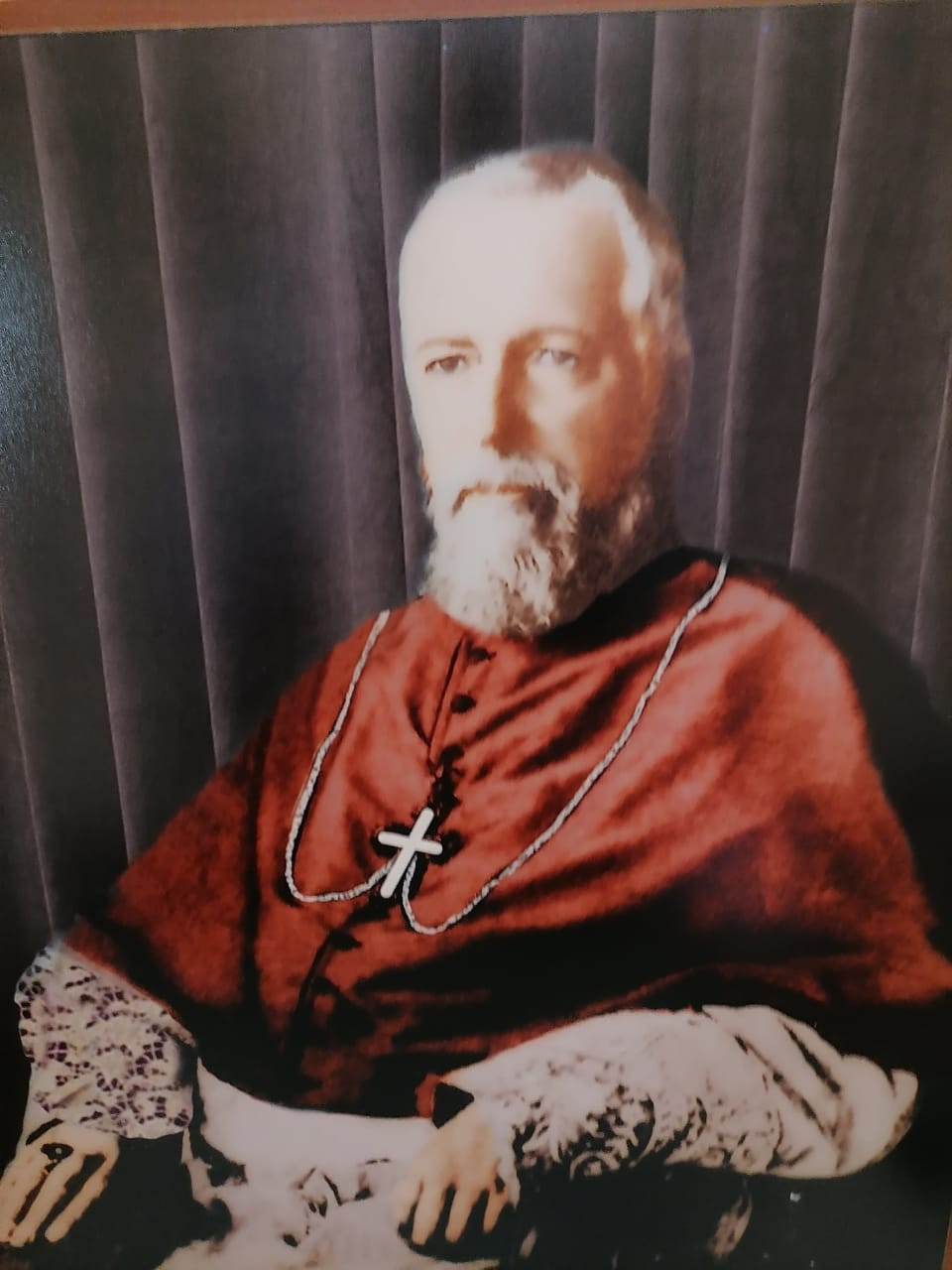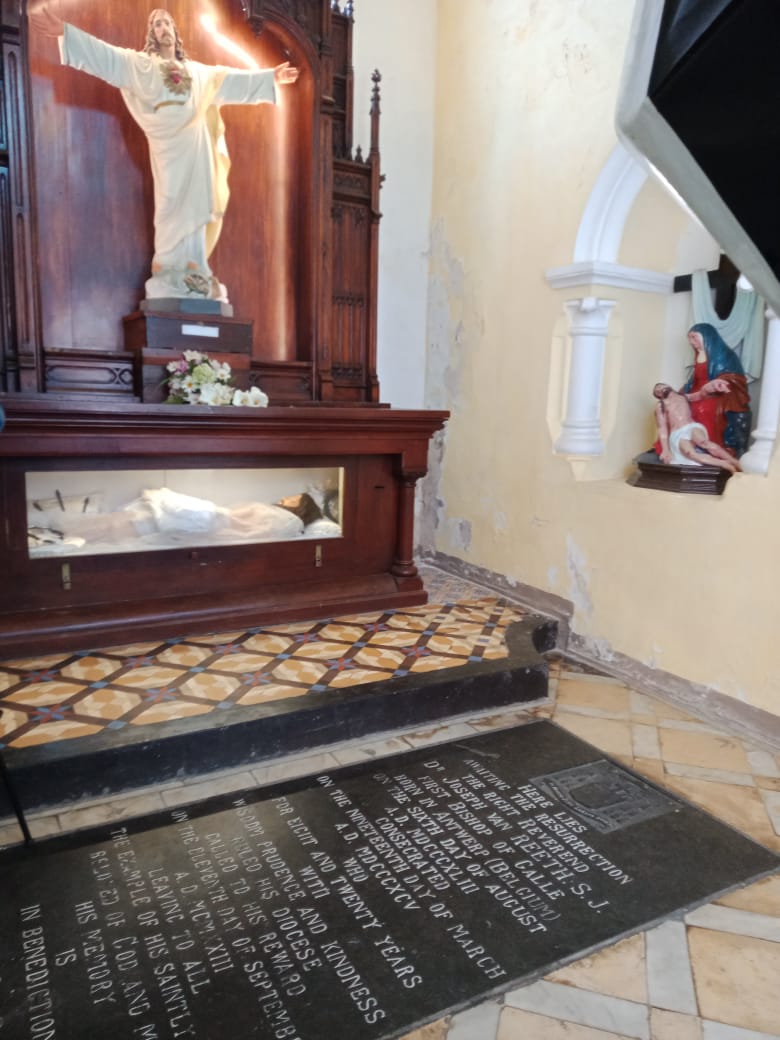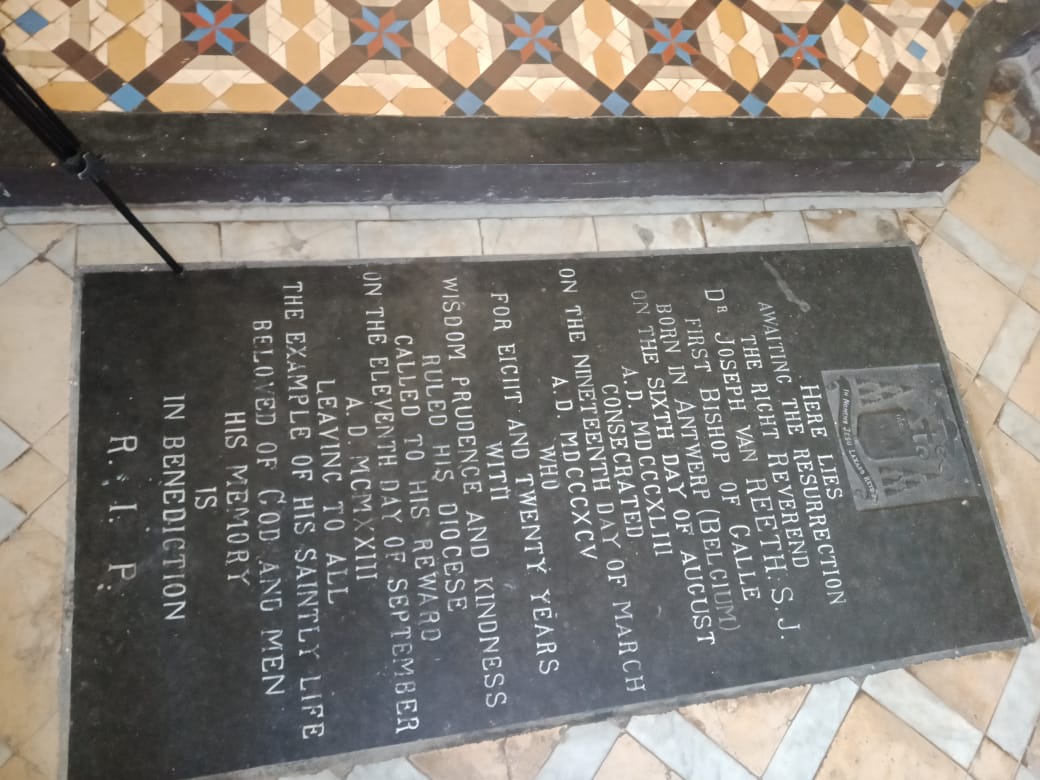
Name : Most Rev. Joseph Van Reeth S.J. Date of birth : 6th August 1843 Father : Mr. Petrus Van Reeth Mother : Mrs. Maria Cenlemans Home town: Antwerp, Belgium Initial Education : Our Lady’s College, Antwerp, Belgium Priestly ordination: 8th September 1857 Episcopal ordination : 19th March 1895 Entry to Eternal Life : 11th September 1923 Offices held: Secretary to Provincial, Provincial, Formator, Bishop
Bishop Van Reeth S. J. was born into a well to do family in the city of Antwerp in Belgium on the 6th of August 1843. His father was Petrus Van Reeth, a prosperous merchant, and his mother Maria Cenlemans. Since his parents were financially stable, and also deeply religious, they were able to give him a good education in a Jesuit Institution. The choice fell on Our Lady’s College in Antwerp. This contact with the Jesuits must have paved the way to his religious and missionary vocation, and eventual coming to Sri Lanka as the first Bishop of Galle. He was the eldest child in a family whose members possessed talents out of the ordinary. This fact combined with a secure home life most probably contributed to his very successful school career. His success shows he was a serious minded and steady youth.
During this period of training, his spiritual life, as well as his innate qualities of mind and heart, developed and blossomed so well, that he was found fit to be ordained a priest on the 8th September 1875.
His remarkable administrative ability, which he probably inherited from his business minded father, was evident even during the time he was in the seminary. His observant superiors were quick to detect this and just two years after his ordination, he was entrusted with the important and responsible post of secretary to the provincial. He held this office for five years. The manner in which he fulfilled his many arduous duties in this capacity coupled with his love of recollection and a deep prayer life, led to his being chosen to guide and direct nearly a thousand Jesuits in Belgium as provincial on 31st July 1882. He shouldered this responsibility for a period of six years. In 1888 he was entrusted with the more important task of training and forming young men to be future Jesuits. It was while he was involved heart and soul in this onerous task, that the Holy See selected him to be the Shepherd and Pastor of the newly formed diocese of Galle in Sri Lanka. In 1895 on the feast of St. Joseph his patron, Father Joseph Van Reeth S.J. was Consecrated Bishop, and subsequently arrived in Ceylon to take charge of the diocese of Galle on the 9th of November of the same year. Responsibility set naturally on his steady and capable shoulders so that at his death, Fr. Joseph Delaney, in his funeral oration was inspired to say of him — “Positions of trust and of the greatest responsibility he always held; in fact, he seemed to be specially destined and fitted out by Providence for them.”
Bishop Van Reeth was a man of few words. He spoke clearly, shortly and succinctly: hence spoke little, smiled less, and laughed still less and never laughed boisterously or thoughtlessly.” (B.6:3) testifies one of his priests. He was a man of reserve, gentle, firm and kind in his relationships with grownups, but with the poor and little children he was his true self — an affectionate loving father deeply concerned about their needs. Little children had a special place in his heart. Like Jesus his master and model, he received them without any formalities they could go at any time to see ‘our dear father Bishop’ as they called him. Sister Margaret Mary remembers how she and other children used to get into their ‘Father’s office’ and how he used to, speak to them lovingly and never sent them away without at least a medal or a holy picture which they treasured highly. In fact the venerable priest who was sometimes distant and reserved with “big” men was always all sweetness to his children. In spite of his many responsibilities, he found time to examine their term reports, encouraging success as well as the weak ones, even if their reports appeared decidedly bad, he tried to look at them in the best possible light. “The conduct was not satisfactory, the application was only fair, but did not the teacher take the boy the wrong way? Was there not some mistake here, or misunderstanding there?” and the dear old Bishop would inquire of the Rector, “What really is the matter with John, father? An unsatisfactory report this time, is he all right with the teacher?” “Was justice done to him?” Indeed the boys were never far from his mind. He would watch them attentively, silently, lovingly, for days, weeks. Then he would, ask the Rector. “What of little Peter, or John or James? Would they not do for the seminary?” Soon a relationship would grow between the pastor and his lambs. “Are you happy?” was his preliminary question to his dear seminarians. “His bright penetrating eyes compelled one to talk out his inner intimate self without fear or any type of shyness.” says one seminarian. A novice of the congregation he founded also says “He looked at me with piercing eyes almost penetrating my very soul.” His warm tender—heartedness was clearly revealed in his reply to Mr. Abeysundera’s words of welcome on his arrival in Galle. “We come to you with a loving heart.” and again, “a return of love will never be wanting on our side.” The poor did not fail to recognize this kindness, and like the children, approached him without any fear or hesitation. Anyone could speak to him as to a brother. He was always affable and courteous and never kept anyone waiting especially the poor. He did not send anyone away empty handed. He had special care and concern for the most needy. He built houses for them, and visited them in their homes even if they were very small mud huts. He was humble. He did not fail to recognize and appreciate the work of those who had gone before. “We cannot be blind to the fact that we come in your midst like the labourers of the eleventh hour; others have borne the burden of the day and the heat. We shall, always preserve in grateful remembrance those who before us, had sown in tears, and in the sweat of their brows.” he says in his opening address to his flock on his arrival in Galle. Even insignificant acts did not go unnoticed or unrewarded. He had a word of special appreciation for a little boy who had braved the weather and come to serve his mass. He said “In spite of the shower you came, very good. God will bless you, and here is my special blessing.” “Straight, sincere to a fault, with a very keen sense of duty, and an extraordinary idea of his responsibility, he gave of his best to his God and his children whose interest he always served.” says Father Delaney, a brother Jesuit. It was said of him at his death that, he was a real chief, a genuine leader of men, by the clearness of his judgment; the precision of his decisions; by the courage to take upon him all responsibility, and by the interest he showed, to every detail without any over—bearing attitude. The essence of his personality however can be summed up in the following words of Fr. Joseph Delaney. “From his earliest years there shone forth from and around him and from his every action a simplicity, a gentleness and piety, which was to accompany him through life and which was but the pale reflection of that soul, which he had consecrated entirely to his God.” The dynamic image of Peter casting his net into the sea at the Lord’s command with complete trust and confidence in his word, was what inspired Bishop Van Reeth to choose his motto “In the name of Jesus I will let down my net.” (Luke 5/5) Referring to the miraculous draught of fishes, he says “We feel confident that the same miracle can be worked over again and that is why we have chosen, this motto.” Again with great hope and confidence he says, “If the fishing be successful we shall beckon, to our partners beyond the seas that they should come and help us.” Such was the magnitude of his expectations of a big ‘haul’. So inspired, ‘the fisherman’ toiled unselfishly to fill the net at his Master’s command the growth in number and strength of the Catholic institutions in the diocese prove that his fishing was successful! Another image that inspired Bishop Van Reeth was, that of the Good Shepherd; trying to bring all the scattered sheep into, one fold “and I have other sheep, that are not of this fold I must bring them also and they will heed my voice so there shall be one flock, and one shepherd.” (Jn. 10/16) Like the Good Shepherd, he was ready to lay down his life, “We come to you with a strong desire of working for you of living for you, if necessary of dying for you! Bishop Van Reeth had identified himself as such with Jesus and his mission, that he did not think that he was merely called by Christ to be sent but called to go WITH HIM. “Behold, I am with you all days even to the consummation of the world.” (Matt. 28/19—20) Being so closely united with Jesus, he had caught a spark of the fire burning within His Heart and this urged him to bring all into the same fold. (Jn.10: 16) This close companionship with Jesus is the essence of his whole life. It is this ‘companionship love’ that he was restless to share. “We come to you with a strong desire of working for you.” “I most gladly will spend and be spent.” (2 Cor. 12:15) When he arrived in Sri Lanka he already had a clear picture of the human situation of the church here. The political setup of the time had had an impact on the church too. The foreign missionaries were at work, and as they focused their attention on the urban areas, the needs of the people in the cities were sufficiently catered for, while those of the ‘natives’ in the rural areas and plantation districts were almost completely over looked. Looking at his vast diocese, he saw the magnitude of the task that lay before him, and his small band of missionaries. “The harvest indeed was great, but the labourers were few”. (Lk. 10/12) It became very clear to him that he had to answer these two great needs, namely to find labourers, and to gather the harvest. Believing in the power of Jesus who was ‘with him’ he chose as his motto; “In the name of Jesus I will let down my net.” Fired by the flame that Christ came to kindle on earth, (Lk 12:49) he launched out into the deep of the villages and plantations districts, boldly moving away from the existing pattern and mentality; with a strong faith and deep conviction, he was able to launch into the unknown and take any risk knowing that the miracle can be worked over again, since this Divine Name is all powerful. With the same daring courage and indomitable faith, he flung open the doors of religious life to the young women of the soil changing the existing conventions of the society. Thus was founded the Congregation of the Sisters of the Holy Angels.


(From A LIGHT IN THE SOUTH by Rev. Mother Martina H.A.)
